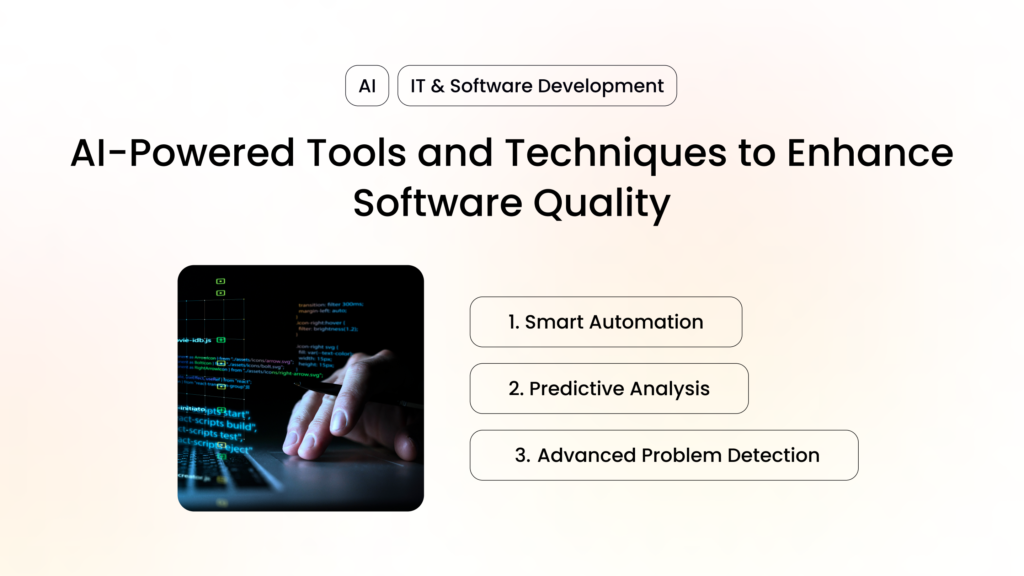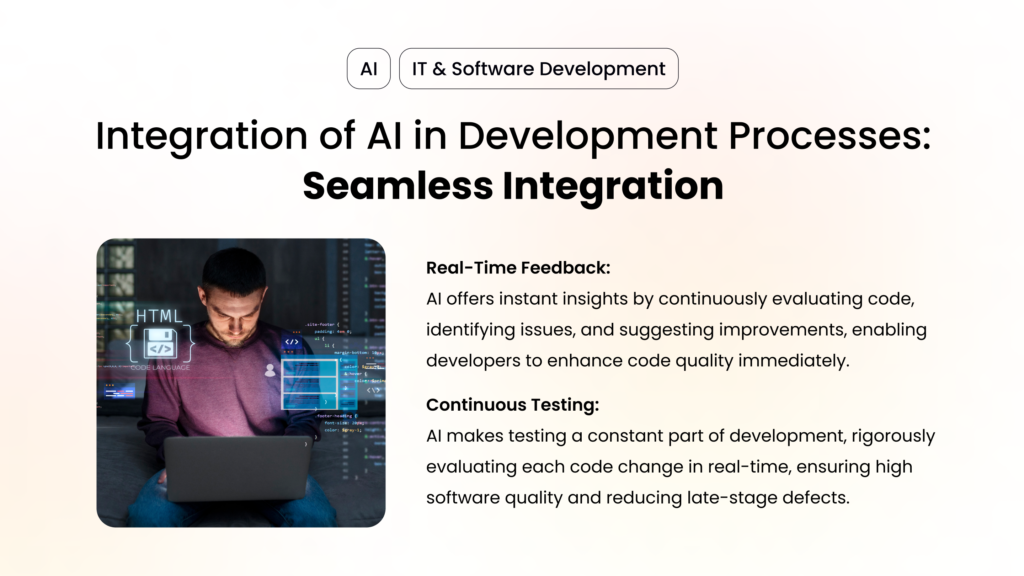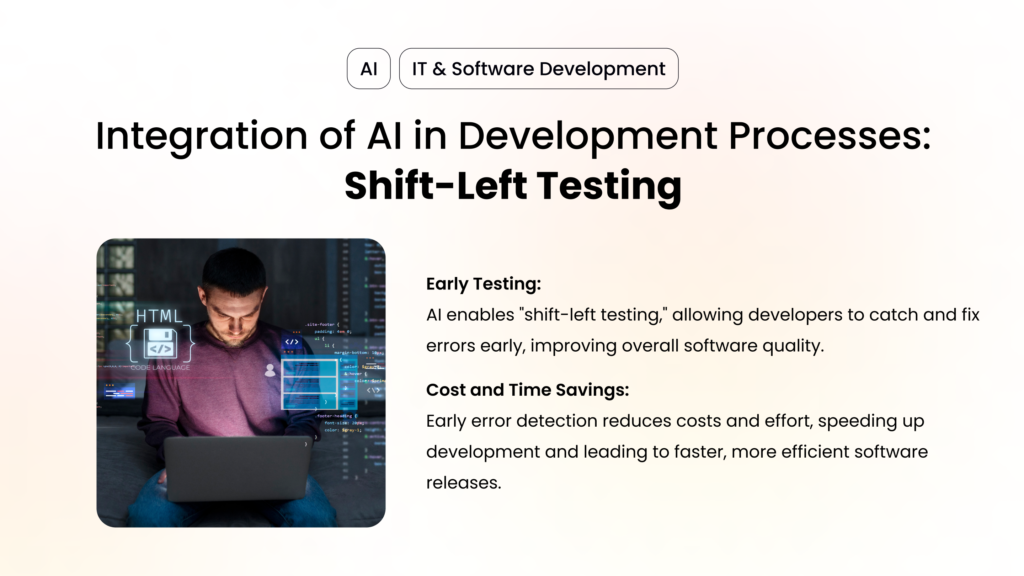In the fast-paced digital age, the need for impeccable software quality has never been greater. With users expecting seamless experiences and businesses relying heavily on robust software, ensuring top-notch quality is a priority.
Software quality encompasses multiple aspects, from functionality and performance to usability and security. It’s not just about software that works; it’s about software that works well and consistently. High-quality software boosts user satisfaction, reduces maintenance costs, and enhances brand reputation.
When software quality is compromised, the consequences can be dire. Consider high-profile failures like the infamous Windows Vista issues or the Target security breach. These incidents not only led to financial losses but also eroded user trust. Ensuring software quality is not just a technical necessity but a business imperative.
In this article, we explore how AI revolutionizes software quality with techniques and tools that help developers create more reliable, efficient, and secure software. From automated testing and debugging to predictive analytics and user behavior modeling, AI offers solutions transforming software quality.
Traditional Challenges in Ensuring Software Quality
Manual regression testing has long been the backbone of software quality assurance. However, it’s a double-edged sword. While thorough, it is incredibly time-consuming and prone to errors. Testers must go through extensive test cases repeatedly, which can be monotonous and lead to oversight.
This process is also resource-intensive. Companies often allocate substantial budgets to employ skilled testers and invest in sophisticated testing environments. Despite these investments, human error remains a constant threat. Even the most diligent tester can overlook subtle bugs, leading to undetected issues that surface post-release.
The Revolution in Regression Testing
AI and machine learning are revolutionizing regression testing. By leveraging these technologies, software developers can automate and optimize the testing process. AI algorithms can learn from previous test cycles, continuously improving their efficiency and accuracy.
AI transforms regression testing by automating repetitive tasks and adapting to new information. Unlike traditional methods, where test cases are static, AI-powered tools can dynamically generate and modify test cases based on real-time data. This adaptability ensures that the tests remain relevant and effective, even as the software evolves.
Key Benefits of AI in Software Quality
- Efficiency and Speed
One of the most significant advantages of AI in software testing is the automation of manual tasks. By taking over repetitive and time-consuming aspects of testing, AI allows human testers to focus on more complex issues. This shift results in significant time savings, accelerating the overall development process.
- Enhanced Accuracy
AI minimizes human errors that are inevitable in manual testing. Automated systems apply consistent standards across all test cases, ensuring uniformity and reducing the risk of oversight. This heightened accuracy translates to more reliable software and fewer post-release issues.
- Cost Efficiency
Incorporating AI into software testing leads to long-term savings. While there may be initial setup costs, the reduction in manpower and resource needs quickly offsets these expenses. Additionally, AI’s ability to detect issues early in the development cycle minimizes costly post-release fixes.
AI-Powered Tools and Techniques to Enhance Software Quality

- Smart Automation
AI-powered tools excel in creating and modifying test cases dynamically. They adapt based on the results of previous tests, continuously improving their effectiveness. This smart automation reduces the burden on human testers and ensures that the testing process evolves with the software.
- Predictive Analysis
AI can predict the outcomes of code changes, allowing for proactive testing. By anticipating potential issues, developers can address them before they become critical. This predictive analysis is invaluable in maintaining software quality and preventing costly failures.
- Advanced Problem Detection
AI’s pattern recognition capabilities enable it to identify issues based on historical data. By analyzing past problems, AI can forecast future vulnerabilities and prevent them from occurring. This advanced problem detection ensures that software remains robust and secure over time.
Integration of AI in Development Processes
Seamless Integration

- Real-Time Feedback
AI integration provides developers with instant insights through real-time feedback mechanisms. By evaluating code continuously as it is written, AI identifies potential issues and suggests improvements on the fly, allowing developers to address faults immediately and enhance code quality.
- Continuous Testing
With AI, testing becomes an ongoing component of the development cycle. Continuous testing ensures that each new addition or modification to the codebase is rigorously evaluated in real-time. This approach helps maintain a high standard of software quality and significantly reduces the chances of later-stage defects.
Shift-Left Testing

- Early Testing
One of the pivotal benefits of AI in software development is the facilitation of early testing, commonly referred to as “shift-left testing.” By incorporating tests early in the development process, developers can catch and rectify errors before they propagate further into the system, which enhances overall software quality.
- Cost and Time Savings
Early issue detection through shift-left testing translates to considerable cost and time savings. By identifying problems at the nascent stages of development, the effort and resources required to address these issues are significantly lower than those required for post-release fixes. This proactive approach not only saves money but also accelerates the development cycle, allowing for faster, more efficient software releases.
Implementing AI in Enhancing Software Quality
The integration of AI in software testing is a game-changer for developers striving to enhance software quality. By automating repetitive tasks, improving accuracy, and predicting potential issues, AI transforms the testing process. The result is faster, more efficient, and reliable software development.
For software developers, the message is clear: AI is not just an optional tool but a crucial component in achieving and maintaining high software quality. By leveraging AI-powered testing tools, developers can ensure that their software meets the highest standards, delighting users and driving business success.
Ready to take your software quality to the next level? Explore the cutting-edge AI-powered testing tools available today and see the difference for yourself.






